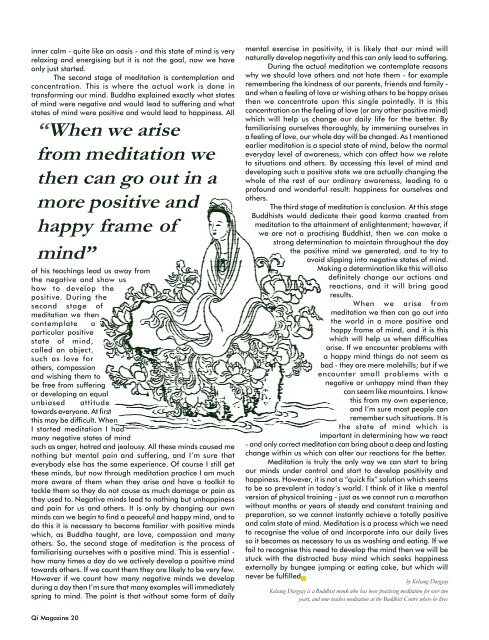Issue 54 - Tse Qigong Centre
Issue 54 - Tse Qigong Centre
Issue 54 - Tse Qigong Centre
- No tags were found...
Create successful ePaper yourself
Turn your PDF publications into a flip-book with our unique Google optimized e-Paper software.
inner calm - quite like an oasis - and this state of mind is veryrelaxing and energising but it is not the goal, now we haveonly just started.The second stage of meditation is contemplation andconcentration. This is where the actual work is done intransforming our mind. Buddha explained exactly what statesof mind were negative and would lead to suffering and whatstates of mind were positive and would lead to happiness. All“When we arisefrom meditation wethen can go out in amore positive andhappy frame ofmind”of his teachings lead us away fromthe negative and show ushow to develop thepositive. During thesecond stage ofmeditation we thencontemplate aparticular positivestate of mind,called an object,such as love forothers, compassionand wishing them tobe free from sufferingor developing an equalunbiased attitudetowards everyone. At firstthis may be difficult. WhenI started meditation I hadmany negative states of mindsuch as anger, hatred and jealousy. All these minds caused menothing but mental pain and suffering, and I’m sure thateverybody else has the same experience. Of course I still getthese minds, but now through meditation practice I am muchmore aware of them when they arise and have a toolkit totackle them so they do not cause as much damage or pain asthey used to. Negative minds lead to nothing but unhappinessand pain for us and others. It is only by changing our ownminds can we begin to find a peaceful and happy mind, and todo this it is necessary to become familiar with positive mindswhich, as Buddha taught, are love, compassion and manyothers. So, the second stage of meditation is the process offamiliarising ourselves with a positive mind. This is essential -how many times a day do we actively develop a positive mindtowards others. If we count them they are likely to be very few.However if we count how many negative minds we developduring a day then I’m sure that many examples will immediatelyspring to mind. The point is that without some form of dailymental exercise in positivity, it is likely that our mind willnaturally develop negativity and this can only lead to suffering.During the actual meditation we contemplate reasonswhy we should love others and not hate them - for exampleremembering the kindness of our parents, friends and family -and when a feeling of love or wishing others to be happy arisesthen we concentrate upon this single pointedly. It is thisconcentration on the feeling of love (or any other positive mind)which will help us change our daily life for the better. Byfamiliarising ourselves thoroughly, by immersing ourselves ina feeling of love, our whole day will be changed. As I mentionedearlier meditation is a special state of mind, below the normaleveryday level of awareness, which can affect how we relateto situations and others. By accessing this level of mind anddeveloping such a positive state we are actually changing thewhole of the rest of our ordinary awareness, leading to aprofound and wonderful result: happiness for ourselves andothers.The third stage of meditation is conclusion. At this stageBuddhists would dedicate their good karma created frommeditation to the attainment of enlightenment; however, ifwe are not a practising Buddhist, then we can make astrong determination to maintain throughout the daythe positive mind we generated, and to try toavoid slipping into negative states of mind.Making a determination like this will alsodefinitely change our actions andreactions, and it will bring goodresults.When we arise frommeditation we then can go out intothe world in a more positive andhappy frame of mind, and it is thiswhich will help us when difficultiesarise. If we encounter problems witha happy mind things do not seem asbad - they are mere molehills; but if weencounter small problems with anegative or unhappy mind then theycan seem like mountains. I knowthis from my own experience,and I’m sure most people canremember such situations. It isthe state of mind which isimportant in determining how we react- and only correct meditation can bring about a deep and lastingchange within us which can alter our reactions for the better.Meditation is truly the only way we can start to bringour minds under control and start to develop positivity andhappiness. However, it is not a “quick fix” solution which seemsto be so prevalent in today’s world. I think of it like a mentalversion of physical training - just as we cannot run a marathonwithout months or years of steady and constant training andpreparation, so we cannot instantly achieve a totally positiveand calm state of mind. Meditation is a process which we needto recognise the value of and incorporate into our daily livesso it becomes as necessary to us as washing and eating. If wefail to recognise this need to develop the mind then we will bestuck with the distracted busy mind which seeks happinessexternally by bungee jumping or eating cake, but which willnever be fulfilledby Kelsang DargyayKelsang Dargyay is a Buddhist monk who has been practising meditation for over twoyears, and now teaches meditation at the Buddhist <strong>Centre</strong> where he livesQi Magazine 20
















